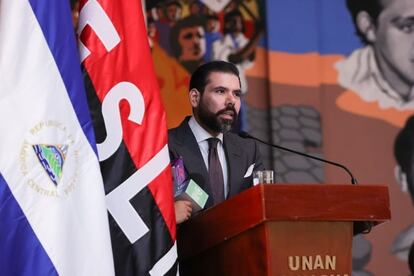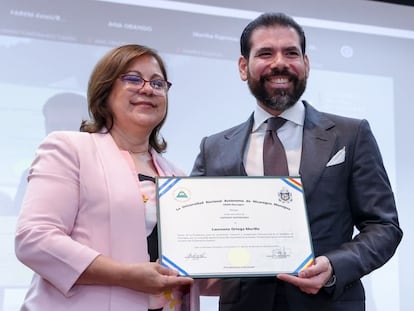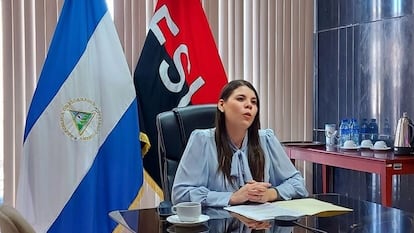Nicaraguan universities open academic year with addresses by the presidential couple’s children
Laureano and Camilia Ortega Murillo gave political speeches praising their parents and ranting against their foes. They spoke of a ‘multipolar world,’ the country’s ‘creative economy,’ and the end of ‘the global U.S. dollar dictatorship’


Laureano Ortega arrived at the National Autonomous University of Nicaragua (UNAN-Managua) to deliver the inaugural address of the 2023 academic year, impeccably dressed in a gray suit with a white shirt and dark maroon tie. One thing he didn’t have was the academic credentials of the typical speakers that give university lectures. But being the son of President Daniel Ortega and Vice President Rosario Murillo was enough to put him on the podium of the most important public higher education institution in Nicaragua. The title of the address delivered by the presidential advisor for investment promotion was “Challenges and opportunities for higher education to achieve well-being in a multipolar world.”
This was no scholarly lecture. Ortega began by greeting all the university leaders present (and subject to his parents’ whims), and then complained about the international sanctions imposed on Nicaragua and the Ortega-Murillo family circle.
“In recent years, we have seen how the United States and its European and Canadian lackeys have imposed so-called sanctions — little more than illegal attacks on the peoples of this world — with even more madness, senselessness and irrationality,” said Laureano, who studied political science and sociology at private universities in Managua, and later audiovisual production in Costa Rica. “They throw out sanctions left and right, but with less and less effect, because the reality is changing. The power balance and alignments now differ greatly from 40 years ago.”
The geopolitical alignments alluded to by Ortega in his April 26 speech is a reference to China, Russia, India, Iran and Arab countries — nations the Nicaraguan regime has courted recently to relieve the international isolation brought on by its relentless violation of human rights since the 2018 uprising. The oppression in Nicaragua is such that experts from the United Nations say it constitutes crimes against humanity intellectually authored by Ortega and Murillo.

Laureano Ortega told his audience that China, Russia, Iran and India are now global leaders in research and development of the technologies of the future, and are “opening the door for mutually beneficial cooperation based on respect and non-interference in the internal affairs of every state.” He predicted the end of “the global dollar dictatorship,” and glossed over the fact that the United States is still Nicaragua’s main trading partner.
“The Arab Countries and China are major global financial centers with the capacity and willingness to offer financial cooperation through loans, investments and joint projects and programs,” said Ortega. “Transactions and exchanges are already conducted without the U.S. dollar. In other words, the global dollar dictatorship is coming to an end. Nicaragua cannot and should not be excluded from this new and much-needed mode for work and financial cooperation.” According to Nicaragua’s La Prensa daily newspaper, Laureano Ortega failed an economic theory course when he was a student at Central American University (UCA), the private Jesuit university that the Sandinista government has strangled financially in retaliation for supporting the youths who protested en masse in 2018.
The international relationships touted by Laureano Ortega have produced little for Nicaragua. Much like the projects he has pushed as the presidential advisor for investment promotion, like the illusory Chinese construction of an interoceanic canal through Nicaragua, or the direct Managua-Rome flight with the Italian Blue Panorama Airlines that only lasted three months.
“We are forging future alliances in a new world that nothing and no one can stop. We are on the cusp of a multipolar world and the demise of the historical hegemony of the United States and its European and Canadian lackeys… Their political and economic blackmail will soon wither and die, thank God,” said Ortega as the audience applauded.
Camila Ortega and the creative economy
In late March, Laureano’s sister, Camila Ortega Murillo, gave the inaugural address at the University of the Autonomous Region of the Nicaraguan Caribbean Coast (URACCAN). Camila is her mother’s personal assistant — Vice President Rosario Murillo — and runs one of the family’s television stations. She is passionate about haute couture and has her own fashion show — Nicaragua Diseña [Nicaragua Designs] — complete with catwalk models. Along with her brother Laureano’s opera festival, the fashion show is heavily promoted by her parents’ regime. Both events receive millions in government funding, and are sponsored by state institutions, companies owned by the ruling family and Sandinista business owners.
In 2019, Camila’s parents created a special position for her: coordinator of the National Commission for Nicaragua’s Creative Economy, comprising several state institutions and supported by the “Nicaragua Diseña platform.” The government claims that the “creative economy” generates “local jobs, income and economic development, as well as income from exports and intellectual property.” However, the impact of this creative economy is nowhere to be seen. Central Bank of Nicaragua (BCN) reports show some macroeconomic recovery but little improvement in the well-being of ordinary Nicaraguans who have fled by the thousands to the United States and other countries. Nearly 7% of Nicaragua’s 6.5 million citizens have left the country to escape its sociopolitical and economic crisis.

Camila has a degree in political science and gave her inaugural address via a live video feed, instead of traveling to the university on Nicaragua’s northern coast, an area that has recently experienced two massacres of indigenous people by land invaders protected by the Sandinista government. Camila didn’t mention the massacres in her speech, but thanked her parents repeatedly. “We are pleased to share that with the guidance and mandate of our president — Commander Daniel — and our vice president — comrade Rosario — we are working diligently to stimulate, promote and develop this creative economy model powered by small and medium-sized enterprises, young entrepreneurs and all the enterprising youth of our country.”
Laureano and Camila are the most visible children in their parents’ regime. The Sandinista sources consulted by EL PAÍS say that both have been assigned special roles by the presidential couple, such as delivering inaugural addresses at universities despite their lack of academic credentials. A professor at a public university who wished to remain anonymous told us that these inaugural addresses reflect the decline of higher education in Nicaragua, recently devastated by university closures and property seizures.
“A few days ago, the government closed three more universities — that’s five this year. The government takes over universities and stifles scientific research, critical thinking and the pursuit of knowledge, while demanding acquiescence and accolades for the regime,” said a humanities professor at a public university. “They impose mediocrity — sending their children to lecture here is proof. They only value servility. It’s a dagger thrust to the heart of university autonomy, which the students of this country have fought so hard to defend, even during the Somoza regimes.”
Sign up for our weekly newsletter to get more English-language news coverage from EL PAÍS USA Edition
Tu suscripción se está usando en otro dispositivo
¿Quieres añadir otro usuario a tu suscripción?
Si continúas leyendo en este dispositivo, no se podrá leer en el otro.
FlechaTu suscripción se está usando en otro dispositivo y solo puedes acceder a EL PAÍS desde un dispositivo a la vez.
Si quieres compartir tu cuenta, cambia tu suscripción a la modalidad Premium, así podrás añadir otro usuario. Cada uno accederá con su propia cuenta de email, lo que os permitirá personalizar vuestra experiencia en EL PAÍS.
¿Tienes una suscripción de empresa? Accede aquí para contratar más cuentas.
En el caso de no saber quién está usando tu cuenta, te recomendamos cambiar tu contraseña aquí.
Si decides continuar compartiendo tu cuenta, este mensaje se mostrará en tu dispositivo y en el de la otra persona que está usando tu cuenta de forma indefinida, afectando a tu experiencia de lectura. Puedes consultar aquí los términos y condiciones de la suscripción digital.








































